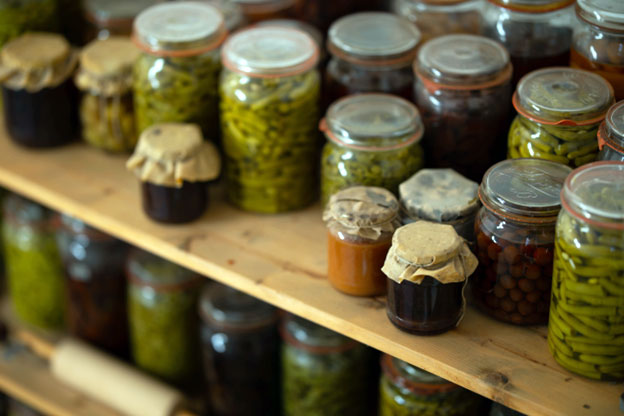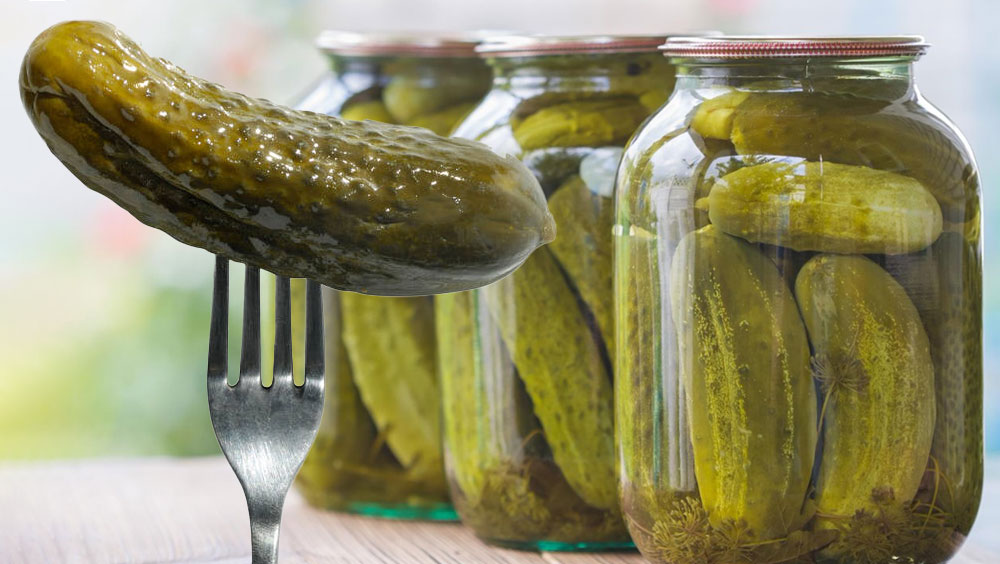Pickles have long been a staple in many dishes and cuisines around the world. While pickles may be thought of as simply a sour, salty snack, they are actually packed with vitamins, minerals, and other health benefits. In this article, we will explore the various benefits of eating pickles and how they can improve overall health.

Rich Source of Probiotics
Pickles are not just a tasty addition to a sandwich or a burger, but they also offer a range of health benefits, especially when it comes to promoting gut health. One of the reasons for this is that pickles are a rich source of probiotics.
The fermentation process that pickles undergo is what creates probiotics. During fermentation, natural bacteria feed on the sugars present in the vegetables, such as cucumbers or mangoes, and produce lactic acid. This lactic acid helps to create an environment that promotes the growth of beneficial bacteria.
Probiotics play a significant role in promoting gut health and improving digestion. They help to maintain a healthy balance of bacteria in the gut, which is essential for optimal digestion and nutrient absorption. Additionally, probiotics can alleviate symptoms of digestive issues like bloating, gas, and constipation.
But the benefits of probiotics go beyond just gut health. They also have a positive impact on our immune system. Probiotics aid the production of immune cells and promote a healthy inflammatory response.
Including pickles in your daily diet is an easy way to increase your intake of probiotics. They are a delicious and convenient source of these beneficial bacteria. So, next time you reach for a pickle, remember that you're not only adding flavor to your meal but also supporting your gut health and immune system.
Low-Calorie Snack Option
Pickles are not only delicious but also a great low-calorie snack option. With their tangy and crunchy taste, they provide a satisfying crunch without packing on the pounds.
In fact, pickles are incredibly low in calories, making them a guilt-free indulgence. A typical serving of pickles contains only a few calories, usually less than 10, depending on the size and type of pickle.
As a low-calorie food, pickles can be a helpful addition to a weight management plan. By substituting high-calorie snacks with pickles, you can reduce your calorie intake without sacrificing flavor. Their low-calorie content allows you to snack on them without worrying about exceeding your daily calorie limit.
Packed with Nutrients
Pickles may be known for their tangy flavor and crisp texture, but they also boast a surprising array of essential vitamins and minerals. These nutrients not only add to the nutritional value of pickles but also contribute to overall health and well-being.
One key nutrient found in pickles is vitamin K. This vitamin plays a crucial role in blood clotting, promoting healthy bones, and supporting cardiovascular health. Additionally, pickles contain iron, a mineral essential for the production of red blood cells and oxygen transport throughout the body. Iron also helps maintain energy levels and aids in cognitive function.
Calcium, another vital mineral, can also be found in pickles. Known for its role in building and maintaining strong bones and teeth, calcium also plays a part in muscle functions, nerve transmission, and blood clotting.
Antioxidant Properties
In addition to their array of essential vitamins and minerals, pickles also pack a punch when it comes to antioxidant properties. Antioxidants, such as vitamin C and beta-carotene, are powerful compounds that help protect our bodies against the harmful effects of free radicals.
Free radicals are unstable molecules that can cause oxidative stress and damage to cells throughout the body. This damage has been linked to chronic conditions such as heart disease, cancer, and even aging. However, the antioxidants found in pickles can help combat these free radicals and reduce oxidative stress.

Vitamin C, commonly associated with citrus fruits, is also present in pickles. This essential nutrient not only boosts the immune system but also acts as a potent antioxidant. It helps neutralize free radicals and supports the health of cells and tissues.
Beta-carotene, a precursor to vitamin A, is another antioxidant found in pickles. It gives certain fruits and vegetables their vibrant colors and offers numerous health benefits. As an antioxidant, beta-carotene helps protect cells from oxidative damage and contributes to overall well-being.
Hydration Benefits
Proper hydration is vital for overall health and bodily functions. Our bodies depend on water to carry out essential processes such as digestion, circulation, and temperature regulation. When we don't consume enough fluids, we can experience symptoms like fatigue, headaches, and difficulty concentrating.
By incorporating pickles into your diet, you can increase your water intake and support hydration. The high water content in pickles helps to replenish fluids in the body and maintain proper hydration levels. This is especially important during hot weather or intense physical activity when we tend to lose more water through sweat.
Blood Sugar Regulation
Vinegar has been shown to have potential benefitsfor individuals with diabetes or insulin resistance. When consumed with a meal, the acetic acid in vinegar can slow down the digestion of carbohydrates, which can help prevent spikes in blood sugar levels. This is particularly beneficial for those with diabetes who need to manage their blood sugar levels effectively.
By including pickles in your daily diet, you can easily incorporate vinegar into your meals. Whether you enjoy cucumber pickles, dill pickles, or even spicy pickles, the vinegar content remains consistent, providing potential blood sugar-regulating benefits.
However, it's important to note that pickles should not be relied upon as the sole means of managing blood sugar levels. A balanced diet, regular exercise, and proper medical advice are essential for individuals with diabetes or insulin resistance.
Electrolyte Balance
Pickles also offer a hidden benefit in the form of electrolyte balance. Electrolytes, such as sodium and potassium, are crucial for the proper functioning of our muscles and nerves.
Pickles, especially those that have been traditionally fermented, are a rich source of electrolytes, primarily sodium. Sodium plays a vital role in maintaining fluid balance in our bodies, regulating blood pressure, and supporting proper muscle and nerve function. Potassium, another electrolyte present in pickles, helps regulate heartbeat, supports muscle function, and aids in nerve impulse transmission.
By including pickles in your diet, you can replenish and maintain electrolyte levels in your body, specifically sodium and potassium. This is particularly beneficial for athletes, as intense physical activity leads to the loss of electrolytes through sweat. Restoring electrolyte balance is crucial for optimal muscle function, preventing muscle cramps, and maintaining overall athletic performance.

Incorporating pickles into your meals can be a tasty way to enhance your electrolyte intake. So, next time you enjoy a sandwich or a salad, consider adding a side of pickles not just for their tangy flavor but also for the hidden electrolyte benefits they offer.
Conclusion
In conclusion, pickles offer a multitude of health benefits that make them a valuable addition to any diet. From their ability to replenish electrolyte levels and support proper muscle and nerve function to their potential role in regulating blood pressure and preventing muscle cramps, pickles are a great choice for athletes and individuals looking to maintain optimal health.
However, it's important to remember that pickles should not be relied upon as the sole source of electrolytes. A well-rounded diet that includes a variety of fruits, vegetables, and whole grains is necessary for maintaining proper electrolyte balance.
Not only do pickles provide numerous health benefits, but they also add flavor and texture to meals. Whether it's the tangy taste of cucumber pickles or the spicy kick of Indian pickles, incorporating pickles into your daily diet can enhance the overall enjoyment of your meals.
So why not give pickles a try? By adding them to your meals or enjoying them as a snack, you can reap the benefits of their essential vitamins, antioxidant properties, and potential probiotics. Improve your health and tantalize your taste buds with the delightful allure of pickles.
Frequently Asked Questions
FAQs about the health benefits of pickles.
Are all pickles equally beneficial, or should I choose specific types?
While all pickles offer some health benefits, certain types may provide additional advantages. Fermented pickles, such as pickled cucumbers or dill pickle, undergo a fermentation process that promotes the growth of healthy bacteria, making them good sources of probiotics. Indian pickles, like mango pickles, often contain spices that offer additional health benefits due to their antioxidant properties.

How much pickle consumption is considered healthy?
Pickles should be consumed in moderation as part of a balanced diet. The sodium content in pickles can vary, with sweet pickles generally having higher sodium levels. Excessive sodium intake may contribute to health conditions such as high blood pressure and heart disease. Aim to consume pickles in reasonable amounts, usually in the form of a few slices or as a condiment to help control your sodium intake.
Can homemade pickles offer the same health benefits as store-bought ones?
Yes, homemade pickles can offer similar health benefits as store-bought options. The pickling process, whether homemade or commercial, helps preserve the beneficial properties of the pickled food. However, be mindful of the quantities of salt or sugar used in homemade pickles to control their potential negative effects.
Are there any potential drawbacks or risks associated with eating pickles?
While pickles offer many health benefits, there are a few potential drawbacks to consider. Pickles that are high in sodium can contribute to increased blood pressure and may be problematic for individuals with certain health conditions like kidney issues. Additionally, overly acidic pickles may cause discomfort for individuals with acid reflux or digestive sensitivity.
Can pickles help with digestive issues like bloating and gas?
Pickles, especially fermented ones, can potentially help ease digestive issues like bloating and gas due to their probiotic content. The healthy bacteria present in fermented pickles can promote a healthy gut environment, aiding digestion and reducing bloating or gas discomfort.
Remember, always consult with a healthcare professional or nutritionist for personalized advice regarding your specific health conditions and dietary needs.


